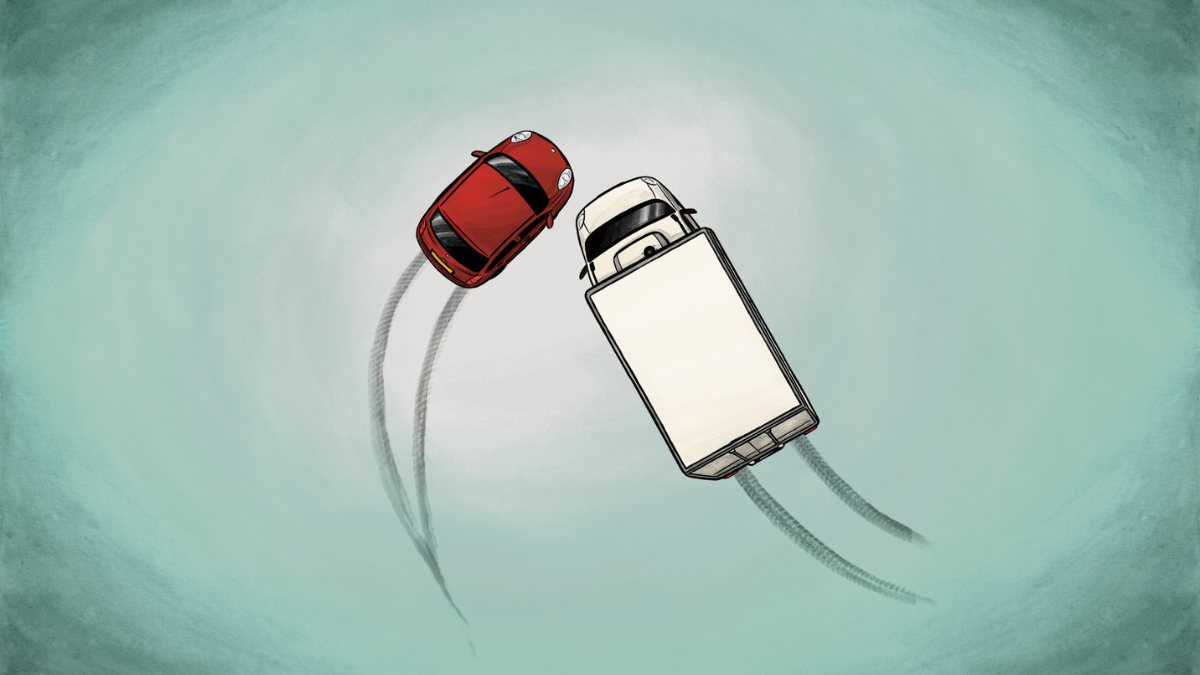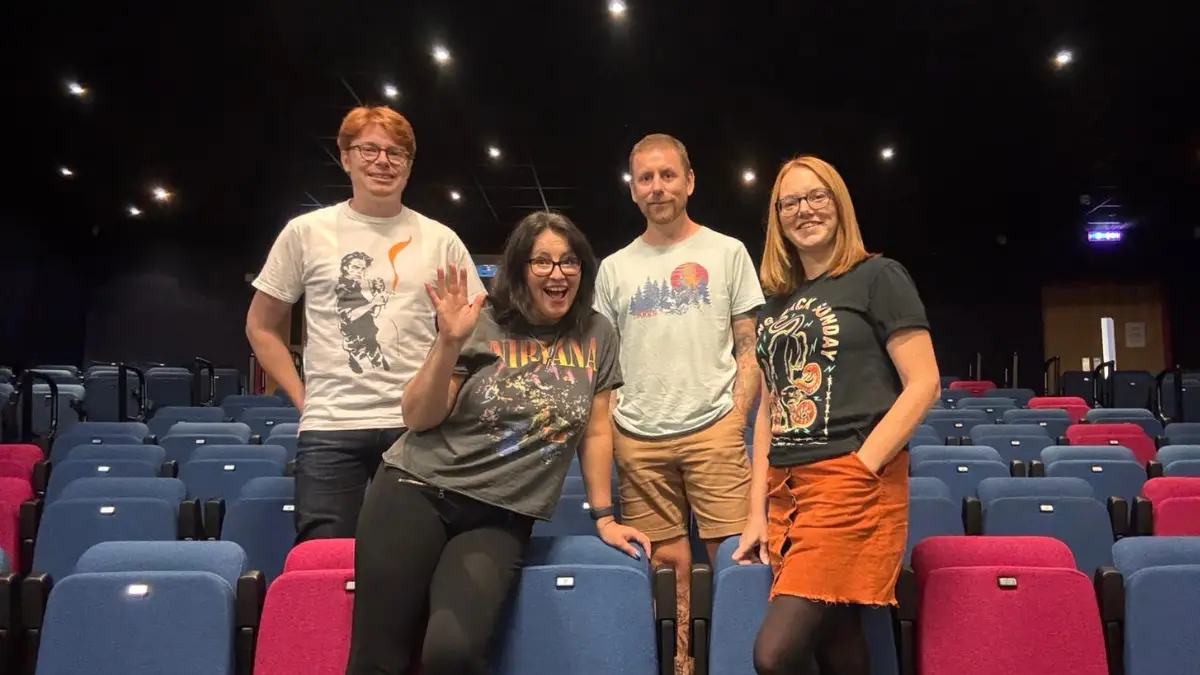Biting Point Writer, Sid Sagar, Discusses His Inspiration for the Play.

How can we be good in a world that makes us so angry?
Biting Point is a brand-new play about road rage, that will be performed in car parks across Yorkshire and the north-east, including three performances in Pocklington between 6 and 7 June.
It mixes live theatre with original music and sound design, experienced through headphones, to ask big questions about class, race and anger in Britain today.
As producers Middle Child reach the midpoint of rehearsals, writer Sid Sagar reveals his inspiration for the play and insights into his process.

Q: When did you know that you wanted to write this story?
During the pandemic, I spent time bouncing between scraps of freelance work as the arts balanced on a knife edge. I was a delivery driver for a supermarket at one point, and I remember drifting through oddly empty roads, interacting with a range of people who were getting to grips with a new world, and weirdly enjoying my newfound sense of freedom. I wanted to write about roads, about road rage, about ordinary people struggling to be heard in a time of profound change.
Q: How did Middle Child come to commission you?
I’d submitted a script about a trio of chaotic football referees to Middle Child and it was very nice to find out that Paul Smith (artistic director) and Matthew May (literary manager) responded positively to my voice. Maybe it had something to do with the fact that we all support football clubs who have, in one way or another, seriously disappointed us in the last few years. I was invited to be one of several associate writers with Middle Child as a result. I took part in various workshops and masterclasses and had a chance to develop my own writing. I want to tell exciting stories in unexpected ways and Paul and Matt know how to turn scripts and ideas into transformative experiences for audiences. I was commissioned in 2023 and here we are, two years later, with the premiere of Biting Point in car parks across Yorkshire and the north-east.
Q: Talk us through your process for writing Biting Point.
It’s a heady mix of proper, quiet focus, bouts of head-scratching fatigue, a bit of anxiety, occasional joy, watching the lives of pigeons through the window next to my desk, writing and re-writing, taking on notes and feedback, invaluable workshop time in a rehearsal room with actors and creatives, sitting in the back of Matt’s car and soaking up Hull’s vibes, changing font to find something cool and artistic, descaling the kettle… It’s a very sophisticated and often humbling process.
Q: Biting Point was developed with Middle Child through two R&D weeks, as part of the National Theatre Generate and Without Walls Blueprint programmes. How did these help shape the final draft?
Both weeks fundamentally shifted my approach to telling this story. Workshopping an early draft of the play at the National Theatre Studio in London allowed us to experiment with headset technology, sound design and radical script changes. Without Walls challenged me to think outside the box, which culminated in the decision to stage Biting Point in car parks instead of traditional theatre spaces. It encouraged me to think about how the work I want to make can be truly accessible to as many people as possible.
Q: Have any other works of art, theatre or otherwise, inspired Biting Point?
I’m particularly inspired by everyday things: I read a lot of news, which is probably not the healthiest decision, from across the political divide and like to know what sort of stuff is on people’s minds. It might be a major scandal but, more often than not, it’s something more mundane and maybe even mildly funny, leading to endless story and plot. I love the spectacle and togetherness of watching professional sport and am keen to grab people’s imaginations in a similar way. I think about the writers whose work has stayed with me over the last few years: the plays of Ayad Akhtar, Bruce Norris and Annie Baker are profound, hilarious and quietly political; while the fiction of Claire Keegan, Paul Murray and Andrew O’Hagan has delighted and devastated me in equal measure and continues to remind me about the power of words.
Q: How have the riots of last summer affected the script’s development?
Biting Point has always been a story about ordinary people trying to keep their heads in the game when the odds are stacked against them. It was always going to touch on knotty things like race, class and community. When disorder kicked off in the summer of 2024, legitimate howls for recognition and opportunity were undermined by instances in which groups of (mostly white) people tried to burn down buildings with groups of (mostly brown) people inside them. I want to write about people on both sides of a debate, in all their complexity.
Q: Where did the idea to stage the play outdoors, in a car park with the audience wearing headphones, come from?
This was the happy result of collaboration and discussion between myself, Paul, Matt and various other creatives involved in the staging of Biting Point. Support from Without Walls also encouraged us to think of innovative ways to stage this work while appealing to new audiences.
Q: What does theatre offer, for engaging with such complex ideas, that other art forms cannot?
Liveness, immediacy, genuine human connection: these things are undervalued in a technology-obsessed, information-overloaded world. There is nothing like a collective experience, whether that’s laughing at a comedy, crying at a tragedy or simply stepping out of a space at the end of an event and turning to your mate and saying: “What did you think?” When it comes to dark or difficult material, theatre forces you to sit up, lean in and engage.
Q: This story is set in Hull but will tour. How will audiences elsewhere relate to John and Anita?
John and Anita are essentially normal people doing normal things. They work, they drive, they laugh, they love, they worry. They increasingly feel the strain of things that are out of their control. Their experiences will resonate with anyone who has struggled to smile through the pain.
Q: This is your first full-length stage play as a writer, but you’re also an experienced actor. How does it feel to be on the other side of the script with Biting Point?
It can be a tricky juggle, but it can also be a very inspiring one. Acting has given me a greater understanding of the work involved in creating new stories, while nurturing my love of truthful, sparky dialogue and characters with complexity. As a writer, I relish the chance to articulate ideas in interesting ways and build worlds that hopefully encourage compassion. Both roles demand a willingness to collaborate, actively listen and learn from the skills of others. I’m chuffed that writing Biting Point has brought me into contact with some incredibly talented actors, creatives and crew.
Q: The BBC recently reported a significant decrease in the staging of new plays. How does it feel to develop Biting Point in this climate?
New writing is vital. The emerging storytellers of today will, with the right support and opportunities, be the playwrights, filmmakers and cultural leaders we turn to in the future. The Society of London Theatres (SOLT) recently reported that theatre attendance increased by 11% on pre-pandemic levels. The West End even outperformed the Premier League. Reshaping budgets away from grassroots cultural engagement - such as in the commissioning and programming of new plays outside the capital - is unnecessarily destructive. I’m grateful to work with a company that is actively addressing the crisis in new writing and the lack of opportunity for writers.
Q: What do you hope audiences take away from seeing the show?
Audiences will be in the thick of the action. They will be witnesses, observers, participants and bystanders. They will be confronted with challenging questions and complicated characters. Their connection with the performers will be immediate. As both a writer and a regular theatre-goer, I think this kind of involvement is hugely exciting. I hope audiences will be entertained and empowered.


